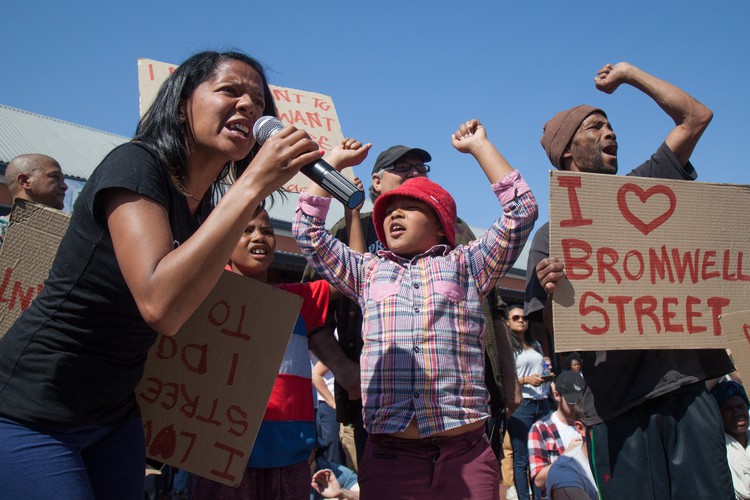Judge urges Bromwell Street parties to mediate
“It is tragic that people would have to go to Wolwerivier [when] there could have been some place closer to Woodstock for them to stay”
The Western Cape High Court once again recommend that the parties in the Bromwell Street eviction case mediate outside of court.
This was suggested by Acting Judge Mark Sher on Wednesday, the second day of a court hearing that will decide the fate of 27 residents of Bromwell Street, Woodstock, who are facing eviction. (Read GroundUp’s report on the first day.)
Sher also pointed out that the developer who is evicting the residents, the Woodstock Hub, was losing a lot of money while the residents remained in their homes. If the residents were placed elsewhere temporarily and the Woodstock Hub contributed towards this accommodation, the Woodstock Hub could end up losing less money, Sher said.
The residents, represented by Ndifuna Ukwazi Law Centre, are arguing that the City should provide them with accommodation that is as near as possible to their current homes.
However, the City contends that the accommodation that it can offer “as near as possible” to the Bromwell property, is Wolwerivier, some 30km from Woodstock.
Sher also reiterated his concerns about the residents moving to Wolwerivier. He expressed fear that if they move to Wolwerivier they will never return to Woodstock.
While he said he understood the importance of following the law, he said he is aware that the relevant personal circumstances of each resident should be taken into account when he makes his ruling.
“It’s unfair and tragic … the law is what the law is, but it is tragic that people would have to go to Wolwerivier and there could have been some place closer to Woodstock for them to stay”, the judge said.
Advocate Karrisha Pillay, for the City, told the court that the City had not changed its stance on the issue since the case first began.
In court papers, the City says: “Simply put, the City does not have any emergency housing developments available within the city centre, it has not embarked on any such developments due to the scarcity of land, the exorbitant costs of such developments in the city centre and that it has prioritised permanent social housing (as opposed to temporary, emergency housing) for development in the immediate proximity of the city within the context of these constraints.”
The City also argues that there needs to be fairness in their provision of housing assistance and that if they offered the residents accommodation in the city centre when there are many people waiting for permanent housing this would be an “unfair, haphazard and potentially discriminatory approach”.
In its court papers, the City said that it is in the process of establishing a number of other affordable housing programmes in the City. These include both social and transitional housing developments. The City released a statement in this regard on Wednesday, setting aside several properties near the city centre for affordable housing.
Support independent journalism
Donate using Payfast

Don't miss out on the latest news
We respect your privacy, and promise we won't spam you.
Next: R66 million paid out to former miners with silicosis
Previous: Hout Bay shows how desperately we need good police leadership
© 2017 GroundUp. 
This article is licensed under a Creative Commons Attribution-NoDerivatives 4.0 International License.
You may republish this article, so long as you credit the authors and GroundUp, and do not change the text. Please include a link back to the original article.

